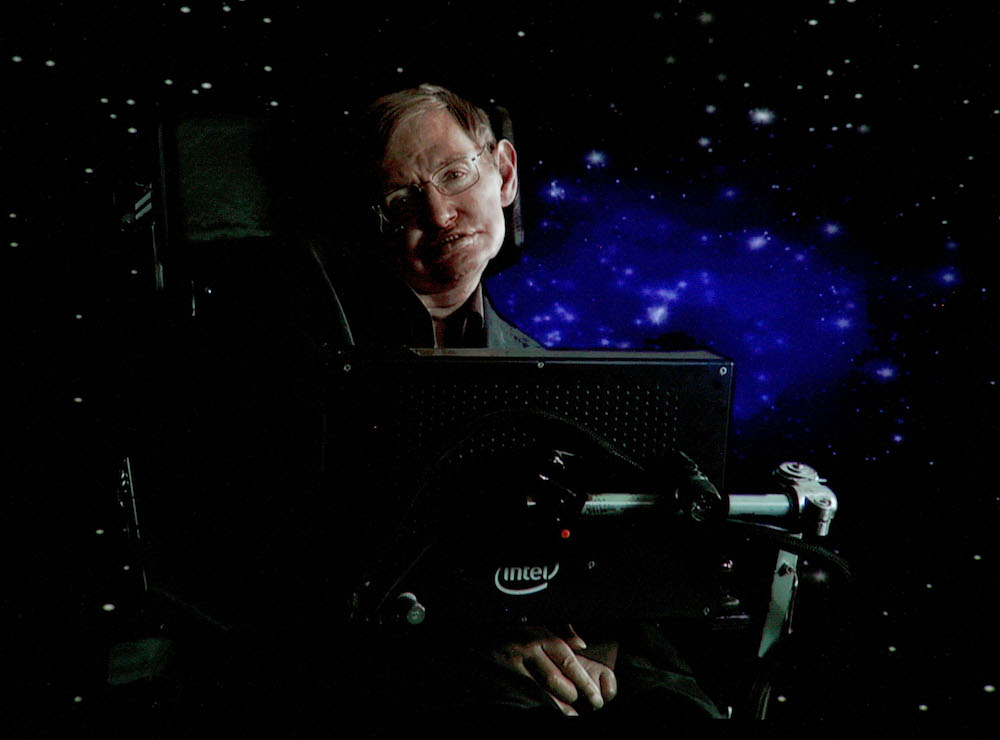Stephen Hawking's Final Book Says There's 'No Possibility' of God in Our Universe

Get the world’s most fascinating discoveries delivered straight to your inbox.
You are now subscribed
Your newsletter sign-up was successful
Want to add more newsletters?

Delivered Daily
Daily Newsletter
Sign up for the latest discoveries, groundbreaking research and fascinating breakthroughs that impact you and the wider world direct to your inbox.

Once a week
Life's Little Mysteries
Feed your curiosity with an exclusive mystery every week, solved with science and delivered direct to your inbox before it's seen anywhere else.

Once a week
How It Works
Sign up to our free science & technology newsletter for your weekly fix of fascinating articles, quick quizzes, amazing images, and more

Delivered daily
Space.com Newsletter
Breaking space news, the latest updates on rocket launches, skywatching events and more!

Once a month
Watch This Space
Sign up to our monthly entertainment newsletter to keep up with all our coverage of the latest sci-fi and space movies, tv shows, games and books.

Once a week
Night Sky This Week
Discover this week's must-see night sky events, moon phases, and stunning astrophotos. Sign up for our skywatching newsletter and explore the universe with us!
Join the club
Get full access to premium articles, exclusive features and a growing list of member rewards.
From his desk at Cambridge University and beyond, Stephen Hawking sent his mind spiraling into the deepest depths of black holes, radiating across the endless cosmos and swirling back billions of years to witness time's first breath. He viewed creation as a scientist, and when he was called to discuss creation's biggest puzzles — Where do we come from? What is our purpose? Are we alone? — he answered as a scientist, often to the chagrin of religious critics.
In Stephen Hawking's final book "Brief Answers to Big Questions," published Tuesday (Oct. 16) by Bantam Books, the professor begins a series of 10 intergalactic essays by addressing life's oldest and most religiously fraught question of all: Is there a God? [Big Bang to Civilization: 10 Amazing Origin Events]
Hawking's answer — compiled from decades of prior interviews, essays and speeches with the help of his family, colleagues and the Steven Hawking Estate — should come as no surprise to readers who have followed his work, er, religiously.
"I think the universe was spontaneously created out of nothing, according to the laws of science," Hawking, who died in March, wrote. "If you accept, as I do, that the laws of nature are fixed, then it doesn't take long to ask: What role is there for God?"
In life, Hawking was a vocal champion of the Big Bang theory — the idea that the universe began by exploding suddenly out of an ultradense singularity smaller than an atom. From this speck emerged all the matter, energy and empty space that the universe would ever contain, and all that raw material evolved into the cosmos we perceive today by following a strict set of scientific laws. To Hawking and many like-minded scientists, the combined laws of gravity, relativity, quantum physics and a few other rules could explain everything that ever happened or ever will happen in our known universe.
"If you like, you can say the laws are the work of God, but that is more a definition of God than a proof of his existence," Hawking wrote.
With the universe running on a scientifically guided autopilot, the only role for an all-powerful deity might be setting the initial conditions of the universe so that those laws could take shape — a divine creator who caused the Big Bang to bang, then stepped back to behold His work.
Get the world’s most fascinating discoveries delivered straight to your inbox.
"Did God create the quantum laws that allowed the Big Bang to occur?" Hawking wrote. "I have no desire to offend anyone of faith, but I think science has a more compelling explanation than a divine creator."
Hawking's explanation begins with quantum mechanics, which explains how subatomic particles behave. In quantum studies, it's common to see subatomic particles like protons and electrons seemingly appear out of nowhere, stick around for a while and then disappear again to a completely different location. Because the universe was once the size of a subatomic particle itself, it's plausible that it behaved similarly during the Big Bang, Hawking wrote.
"The universe itself, in all its mind-boggling vastness and complexity, could simply have popped into existence without violating the known laws of nature," he wrote.
That still doesn't explain away the possibility that God created that proton-size singularity, then flipped the quantum- mechanical switch that allowed it to pop. But Hawking says science has an explanation here, too. To illustrate, he points to the physics of black holes — collapsed stars that are so dense, nothing, including light, can escape their pull.
Black holes, like the universe before the Big Bang, condense into a singularity. In this ultra-packed point of mass, gravity is so strong that it distorts time as well as light and space. Simply put, in the depths of a black hole, time does not exist.
Because the universe also began as a singularity, time itself could not have existed before the Big Bang. Hawking's answer, then, to what happened before the Big Bang is, "there was no time before the Big Bang."
"We have finally found something that doesn’t have a cause, because there was no time for a cause to exist in," Hawking wrote. "For me this means that there is no possibility of a creator, because there is no time for a creator to have existed in."
This argument will do little to persuade theistic believers, but that was never Hawking's intent. As a scientist with a near-religious devotion to understanding the cosmos, Hawking sought to "know the mind of God" by learning everything he could about the self-sufficient universe around us. While his view of the universe might render a divine creator and the laws of nature incompatible, it still leaves ample space for faith, hope, wonder and, especially, gratitude.
"We have this one life to appreciate the grand design of the universe," Hawking concludes the first chapter of his final book, "and for that I am extremely grateful."
Originally published on Live Science.

Brandon is the space / physics editor at Live Science. With more than 20 years of editorial experience, his writing has appeared in The Washington Post, Reader's Digest, CBS.com, the Richard Dawkins Foundation website and other outlets. He holds a bachelor's degree in creative writing from the University of Arizona, with minors in journalism and media arts. His interests include black holes, asteroids and comets, and the search for extraterrestrial life.
 Live Science Plus
Live Science Plus





